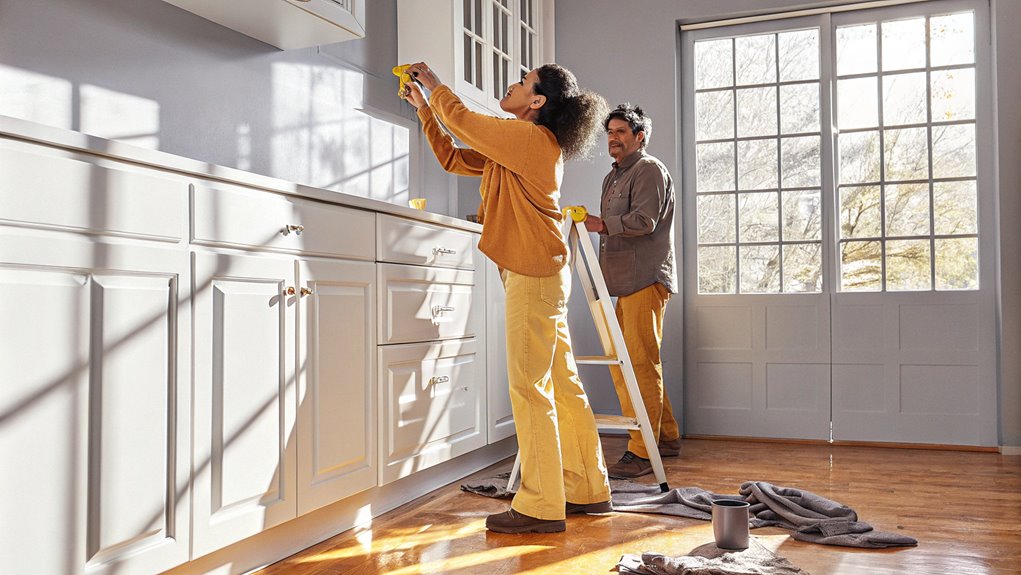Your house can help protect you from rising prices. When you get a fixed home loan, your monthly payment stays the same even when other things cost more. Your home can grow in value each year, which means you have more money. You can also save on taxes because you own a home. If you want, you could rent out a room to make extra money. These things work together to keep your money safe when prices go up. This is why having a home is smart when costs are rising. It's like having a shield that protects your money.
Understanding Real Estate During Inflation

When prices go up, homes can help protect your money. Think of your home like a piggy bank that grows bigger over time. While other things get more expensive, your home usually becomes worth more too.
Your home sits on land. We can't make more land, and more people need homes every day. This makes your land more special.
When builders need to make new houses, they've to pay more for wood and bricks. This makes older homes worth more money too.
If you got a home loan with the same payment each month, you're in luck. As money loses some of its power over time, your house payments stay the same.
This means you win by paying back your loan with money that doesn't buy as much as it used to.
Fixed-Rate Mortgages Lock Lower Costs
Your mortgage payments stay the same each month when you get a fixed-rate loan.
The bank can't make you pay more money, even when prices go up for other things. This helps you save money and plan better for the future.
Think of it like making the same dinner payment at your favorite restaurant – the price never goes up!
This is why many people pick fixed-rate loans to protect their money.
Monthly Payments Stay Same
You don't have to worry when you get a fixed-rate home loan. Your monthly payment stays the same – no surprises! Think of it like a shield that protects you from paying more money each year.
When you rent a home, your payments usually go up every year. But with your own home loan, you pay the same amount month after month, year after year. This helps you plan better.
As time goes by, your paycheck will likely get bigger. But your house payment won't change at all. It might even feel easier to pay as the years pass.
Plus, the money you use to pay your loan later won't be worth as much as when you first got it. That's good news for you!
Loan Costs Never Change
Getting a fixed-rate home loan is like having a super shield for your wallet. Once you pick your rate, it stays the same forever – like a faithful friend who never lets you down.
Think of it this way: The money you pay each month will not go up or down. If you pay $2,500 today, you'll pay the same $2,500 in 30 years. This is true even when other things in life get more costly.
| What You Pay | First Month | Last Month |
|---|---|---|
| Interest Rate | 6.5% | 6.5% |
| Main Payment | $1,500 | $1,500 |
| Total Bill | $2,500 | $2,500 |
Your friends who picked loans with rates that can change might have to pay more when prices go up. But not you! Your fixed-rate loan keeps your payments steady, like a rock in a storm.
Rental Income Potential

Turning your home into a money-maker is smart when prices keep going up. You can share your home by renting out an empty room. Or fix up your basement to make it a cozy spot for renters. Many people also rent their homes to travelers for short stays.
As rents go up, you can earn more money to help pay for other things that cost more now. When you rent part of your home, you can change the price based on what others charge. This helps you keep up with rising costs.
To get more rent money, make your space better. Add a door to the outside. Put in new kitchen stuff. Make a spot for cars to park.
These small changes can help you get better renters who'll pay more. This extra cash helps when everything else costs more.
Home Value Appreciation Trends
Your home can grow in value over time, which helps protect your money from rising costs. Think of it like a piggy bank that gets bigger on its own.
Let me share some simple facts about how homes grow in value:
- Homes go up about 4% in price each year
- City homes often grow more in price as more people move there
- Homes near good schools tend to be worth more
- Fixing up your home can make it worth more money
- Homes near oceans or in tech cities often grow a lot in price
When you know how home prices rise, you can make better choices.
As your home gets more valuable and you pay off your loan, you build up money you can use later.
Tax Benefits of Homeownership

Owning a home can help you save money on taxes. When you pay your monthly house payment, part of what you pay in interest can lower your taxes. The same goes for the taxes you pay on your home – you can save up to $10,000 there too.
If you sell your home and make money on it, you won't have to pay extra taxes on the first $250,000 if you're single. If you're married, this goes up to $500,000. But you must live in your home for at least two years out of five years to get this deal.
You can also save money if you work from home or paid special fees when buying your house.
All these tax breaks help you keep more money in your pocket and build up savings over time.
Building Long-Term Equity
When you buy a home, you grow your money in a special way. Each time you pay your monthly bill, you own more of your home. This is called building equity. It's like filling up a piggy bank!
Your home helps you in many ways:
- Your monthly payments help you save money instead of paying rent
- Houses often become worth more money over time
- You can use your home's value to help pay for big things later
- When you fix up your home, it can be worth more
- Every payment you make helps you own more of your home
Your home is like a safe place for your money. As prices go up in the world, your home's value usually goes up too. This helps keep your money safe for the future.
Home Improvements Add Value

Your home can be worth more with smart fixes. Think about making your kitchen look better or giving your bathrooms a fresh look. New windows that save power are also good choices. These changes keep their value even when money gets tight.
Pick fixes that make your home work better and look nicer. A new heating system can cut your bills. Better walls can keep warm air in. Making your basement or attic into living space adds value too.
Even small things like new paint, new lights, and pretty plants help your home stay worth more as prices go up.
Look at other homes near you. Make sure your fixes match what others in your area have done. This helps you spend your money wisely.
Leveraging Home Equity Lines
Your house can help you fight rising costs. When you get a home credit line (HELOC), you can borrow money using your house. As your house goes up in value, you can borrow more money.
A HELOC lets you:
- Take only the money you need, when you need it
- Pay less than you'd on credit cards
- Save on taxes if you fix up your home
- Get more money as your house goes up in value
- Choose how to pay it back
- Use the money for many things, like paying off bills or buying big items
But be smart! Make sure you can pay back what you borrow.
If you don't pay, you could lose your house.
Real Estate Market Cycles

When you buy a house, it's good to know how home prices go up and down over time.
Just like the seasons change, home prices follow a pattern too. Sometimes prices go up when many people want to buy homes and not many are for sale.
Other times, prices drop when fewer people can buy or too many homes are for sale.
Look at how prices changed in your area before. This will help you pick the right time to use your home's value or buy more houses.
Historical Price Growth Patterns
Houses go up and down in value like a roller coaster. This happens over and over about every 15 years.
When you look back at house prices, you can see they grow more than what things cost at the store.
Here's what happens with house prices:
- A house worth $100,000 today might be worth $200,000 in 20 years
- Most homes go up in value by 3-5% each year
- Houses near beaches or big cities often cost more
- Local jobs and shops can make prices go up or down faster
- When house prices fall, they usually come back up twice as fast
If you know these ups and downs, you can pick a good time to buy or sell your house.
Your house can also keep your money safe when things get more costly.
Supply and Demand Cycles
The housing market goes up and down like a seesaw. First, home prices start to go up as more people want to buy. Then lots of people rush to buy homes, making prices jump even higher.
After that, too many new homes get built and sit empty. Finally, prices fall and homes take a long time to sell.
When you know what part of this up-and-down pattern you're in, you can make better choices. If prices are going up, your home might be worth more each year. If too many homes are for sale or prices are falling, you might need to wait longer to sell.
The best time to buy is when lots of homes are for sale and few people are buying. The best time to sell is when many people want to buy but can't find enough homes.
Identifying Market Timing
Buying or selling a home is all about good timing. The housing market goes up and down like waves at the beach. You can learn when these waves will come and go.
Look for these signs to help you decide:
- When banks change how much it costs to borrow money
- When more or less people move to your area
- When builders put up new homes
- How long it takes homes to sell
- If home prices go up or down near you
Keep an eye on these signs for a few months. When many signs point the same way, the market might change soon.
What happens in other cities may not happen in yours, so look at what's going on in your own town.
Property as Inherited Wealth
Homes help families grow stronger over time. When mom and dad give you their house, you get more than a place to live. You get something very special that they worked hard to own.
A house from your family can help you in many ways. You can live in it, rent it to others, or sell it for money. The best part is that you won't have to pay lots of taxes on it like other things you might get from your parents.
Think of it like a piggy bank that got bigger while your parents had it. Now it's your turn to have this big gift from them.
Many families pass down their homes to help their kids have a better life.
Mortgage Debt Vs Rising Prices

Think of your fixed-rate mortgage as a big umbrella that keeps you safe when prices go up.
Each month, you pay the same amount for your home. But over time, prices for things like food and gas get higher.
Your house usually becomes worth more money too. This means the same monthly payment feels smaller as time goes by, since those dollars are worth less than when you first got your loan.
Fixed Rate Shields Wealth
When prices go up, a fixed house payment helps protect your money. Think of it like a strong shield that keeps your costs steady while other people pay more and more.
Your monthly payment never changes. But look what happens around you:
- Rent costs keep going up
- Your house grows in value
- Your paycheck usually gets bigger
- Everything else costs more
But your house payment? It stays the same. This means each year, that big loan you took gets easier to pay off. It's like paying back old debt with new money that's worth less.
This works best when prices keep going up for a long time. That's why buying a house can be a smart way to keep your money safe when things get more expensive.
Home Values Keep Pace
Your house can help protect you from rising prices. Think of your home like a piggy bank that grows with time. When prices go up in stores, your home's value usually goes up too.
Look at the numbers:
| Year | Avg Home Value | Inflation Rate | Home Value Growth |
|---|---|---|---|
| 2019 | $320,000 | 2.3% | 3.8% |
| 2020 | $340,000 | 1.4% | 6.2% |
| 2021 | $375,000 | 7.0% | 10.3% |
| 2022 | $428,000 | 6.5% | 14.1% |
| 2023 | $459,000 | 3.4% | 7.2% |
Your house payment stays the same each month. But your home gets more valuable over time. This means you own more of your home's worth as time goes by. It's like having a shield that keeps your money safe when prices go up.
Payments Stay Consistent
When you get a fixed mortgage, your monthly payment stays the same. This is very helpful when prices go up for things like food and gas. Your home payment won't change if you lock in your rate.
Having the same payment each month helps you in many ways:
- Your payment won't go up like rent does
- As money is worth less, your old payment costs you less
- You pay your loan with dollars that aren't worth as much
- As you make more money, your payment feels smaller
- You know what to pay each month, no matter what happens
When prices go up all around you, it's nice to have one big bill that never changes.
Strategic Refinancing Options
Thinking about a new home loan? You can save money when rates go down.
Getting a new loan with a lower rate means paying less each month. This helps when prices for food and gas keep going up.
You can also get cash from your home's worth. Use this money to fix up your house or pay off credit cards that cost you a lot in fees.
Some loans start with low rates that can change later. These can help you save now, but watch out – the rates might go up after a few years.
If you own a good part of your home, you can also get a special credit line. This lets you borrow money when you need it while keeping your main home loan the same.







